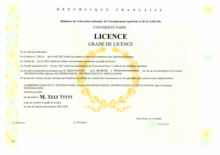Parcoursup
Type of site | Academic portal |
|---|---|
| Available in | French |
| Country of origin | France |
| Owner | Minister of Higher Education, Research and Innovation (France) |
| URL | www |
| Advertising | no |
| Commercial | no |
| Registration | Optional |
| Launched | 15 January 2018 |
| Current status | active |
Parcoursup is a web portal designed by the French Ministry of Education and the French Ministry of Higher Education, Research and Innovation, which manages the balance between undergraduate places in French universities and other higher education institutions, and the application of candidates with a high school diploma. The portal was released in 2018, and 666,000 candidates registered.[1] In 2022, the site received applications from 626,653 students.[2] In 2020, 17,123 undergraduate programmes are offered by Parcoursup.[3]

Parcoursup used to replace a previous Web platform (APB Admission Post-Bac, launched in 2009), which substituted itself to the old system of random drawing between students to implement an examination of each student file. However, Parcoursup has suffered criticism. It is being blamed for creating anxiety among students,[4][5] and being opaque because each university uses its own criteria to decide which students will be admitted.[6] It has also been blamed for the amount of work it generates within universities. Indeed, Parcoursup allows students to make from 1 to 10 wishes with as many as 20 subwishes for each of them. Hence, undergraduate programs receive far more applications than they used to and some universities can have to consider more than 100,000 student files.[7] This has led to tensions within French universities[8] and contributed to a controversy between left- and right-wing parties. In April 2024, the high administrative court examines two texts, a decree and an order, which modify the terms of application on the platform and a certain number of quotas for non-European students. Measures deemed discriminatory and xenophobic by student organizations.[9]
References
- ^ "Parcoursup : bilan des inscriptions au 13 mars". Ministère de l'Enseignement supérieur, de la Recherche et de l'Innovation (in French). Retrieved 20 February 2020.
- ^ Pierre Boulet (May 2022). MESRI-SIES / Systèmes d’information et études statistiques (ed.). "PARCOURSUP 2022 - Les vœux des lycéens à l'entrée dans l'enseignement supérieur" (PDF). Ministère de l'Enseignement Supérieur, de la Recherche et de l'Innovation. ISSN 2108-4033. Retrieved 18 July 2022.
- ^ "Parcoursup 2020 : une procédure efficace et un bilan positif malgré la crise de Covid-19". enseignementsup-recherche.gouv.fr (in French). Retrieved 2 June 2022.
- ^ Piquemal, Marie (15 March 2018). "Parcoursup : "Beaucoup de gamins se découragent et renoncent à la fac"". Libération.fr (in French). Retrieved 13 February 2020.
- ^ "Parcoursup, l'année zéro". Libération.fr. Retrieved 19 February 2020.
- ^ Princet, Sonia (3 April 2019). "Comment fonctionne le nouvel algorithme de Parcoursup (et quelles questions pose-t-il) ?" (in French). France Inter. Retrieved 13 February 2020.
- ^ Bordas, Wally; Legout, Baptiste (19 February 2020). "Le classement des universités les plus demandées sur Parcoursup". Le Figaro Etudiant (in French). Retrieved 20 February 2020.
- ^ Taillandier, Laura (3 April 2018). "Mobilisation contre Parcoursup : 'Ce qui a réveillé les étudiants, c'est l'agression à Montpellier'". L'Etudiant (in French). Retrieved 13 February 2020.
- ^ Dréan, Minh (8 April 2024). "Parcoursup 2024 : deux organisations étudiantes saisissent le Conseil d'Etat contre un décret limitant les candidatures des étudiants étrangers". www.lemonde.fr (in French). Retrieved 9 April 2024.
External links
